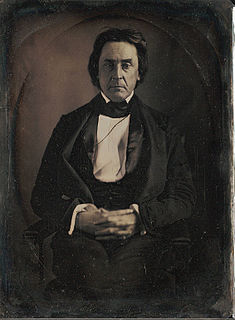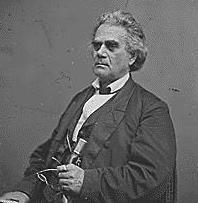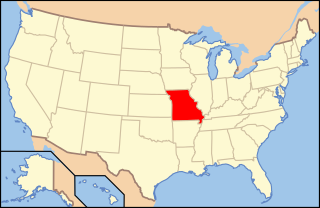
David Rice Atchison was a mid-19th century Democratic United States Senator from Missouri. He served as President pro tempore of the United States Senate for six years. Atchison served as a major general in the Missouri State Militia in 1838 during Missouri's Mormon War and as a Confederate brigadier general during the American Civil War under Major General Sterling Price in the Missouri Home Guard. He is best known for the claim that for 24 hours—Sunday,March 4,1849 through noon on Monday—he may have been Acting President of the United States. This belief,however,is dismissed by nearly all historians,scholars,and biographers.

In the context of the American Civil War (1861–65),the border states were slave states that did not secede from the Union. They were Delaware,Maryland,Kentucky,and Missouri,and after 1863,the new state of West Virginia. To their north they bordered free states of the Union and to their south they bordered slave states of the Confederacy,with Delaware being an exception to the latter.

In the United States before 1865,a slave state was a state in which slavery and the slave trade were legal,while a free state was one in which they were not. Between 1812 and 1850,it was considered by the slave states to be politically imperative that the number of free states not exceed the number of slave states,so new states were admitted in slave–free pairs. There were,nonetheless,some slaves in most free states up to the 1840 census,and the Fugitive Slave Act of 1850 specifically stated that a slave did not become free by entering a free state.

The Corwin Amendment is a proposed amendment to the United States Constitution that would shield "domestic institutions" of the states from the federal constitutional amendment process and from abolition or interference by Congress. Although the Corwin Amendment does not explicitly use the word slavery,it was designed specifically to protect slavery from federal power. Congress proposed the Corwin Amendment on March 2,1861,shortly before the outbreak of the American Civil War. It has not been ratified by the requisite number of states.

The Constitutional Union Party was a United States third party active during the 1860 elections. It consisted of conservative former Whigs,largely from the Southern United States,who wanted to avoid secession over the slavery issue and refused to join either the Republican Party or the Democratic Party. The Constitutional Union Party campaigned on a simple platform "to recognize no political principle other than the Constitution of the country,the Union of the states,and the Enforcement of the Laws".
The Crittenden Compromise was an unsuccessful proposal to permanently enshrine slavery in the United States Constitution,and thereby make it unconstitutional for future congresses to end slavery. It was introduced by United States Senator John J. Crittenden on December 18,1860. It aimed to resolve the secession crisis of 1860–1861 that eventually led to the American Civil War by addressing the fears and grievances of Southern pro-slavery factions,and by quashing anti-slavery activities. The Crittenden Compromise is not to be confused with the Crittenden Resolution,which provided that the Union would take no actions against slavery.

The 37th United States Congress was a meeting of the legislative branch of the United States federal government,consisting of the United States Senate and the United States House of Representatives. It met in Washington,D.C. from March 4,1861,to March 4,1863,during the first two years of Abraham Lincoln's presidency. The apportionment of seats in the House of Representatives was based on the Seventh Census of the United States in 1850.

John Goode Jr. was a Virginia Democratic politician,lawyer and slaveowner who served in the Virginia House of Delegates representing Bedford County before the American Civil War,for which he voted during the Virginia Secession Convention,then served in the Confederate Congress and on the staff of General Jubal Early during the conflict. After the conflict,he moved to Norfolk,again won election to the House of Delegates,and then represented Virginia's 2nd congressional district for three terms during the postbellum United States House of Representatives and lastly represented Norfolk and was elected chairman of the Virginia Constitutional Convention of 1902. Goode also served as the acting Solicitor General of the United States during the presidency of fellow Democrat Grover Cleveland.
Anderson Mitchell was a Congressional Representative from North Carolina.

Charles Daniel Drake was a United States Senator from Missouri and Chief Justice of the Court of Claims.
The Missouri Constitutional Convention of 1861–1863 was a constitutional convention held in the state of Missouri during the American Civil War. The convention was elected in early 1861,and voted against secession. When open fighting broke out between Pro-Confederate governor Claiborne Fox Jackson and Union authorities,and Union forces occupied the state capital,the convention formed a provisional state government,and functioned as a quasi-legislature for several years. The convention never did produce a new constitution;that task was delegated to a new convention,elected in 1864.

Elijah Hise was a United States diplomat and U.S. Representative from the 3rd district of Kentucky.

Charles Swearinger Lewis was a U.S. Representative from Virginia.

Muscoe Russell Hunter Garnett,was a nineteenth-century politician and lawyer from Virginia.
In the context of the United States,secession primarily refers to the voluntary withdrawal of one or more states from the Union that constitutes the United States;but may loosely refer to leaving a state or territory to form a separate territory or new state,or to the severing of an area from a city or county within a state. Advocates for secession are called disunionists by their contemporaries in various historical documents.

The Missouri Constitution is the state constitution of the U.S. State of Missouri. It is the supreme law formulating the law and government of Missouri,subject only to the federal Constitution,and the people. The fourth and current Missouri Constitution was adopted in 1945. It provides for three branches of government:legislative,executive,and judicial. It also sets up local governments in the form of counties and cities.
Virginia v. West Virginia,78 U.S. 39 (1871),is a 6-to-3 ruling by the Supreme Court of the United States which held that where a governor has discretion in the conduct of the election,the legislature is bound by his action and cannot undo the results based on fraud. The Court implicitly affirmed that the breakaway Virginia counties had received the necessary consent of both the Commonwealth of Virginia and the United States Congress to become a separate U.S. state,and explicitly held that the counties of Berkeley and Jefferson were part of the new State of West Virginia.
James Harvey Birch was a Missouri politician and a judge of the Supreme Court of Missouri from 1849 to 1851.

The Virginia Secession Convention of 1861 was called in Richmond to determine whether Virginia would secede from the United States,to govern the state during a state of emergency,and to write a new Constitution for Virginia,which was subsequently voted down in referendum under the Confederate Government.













